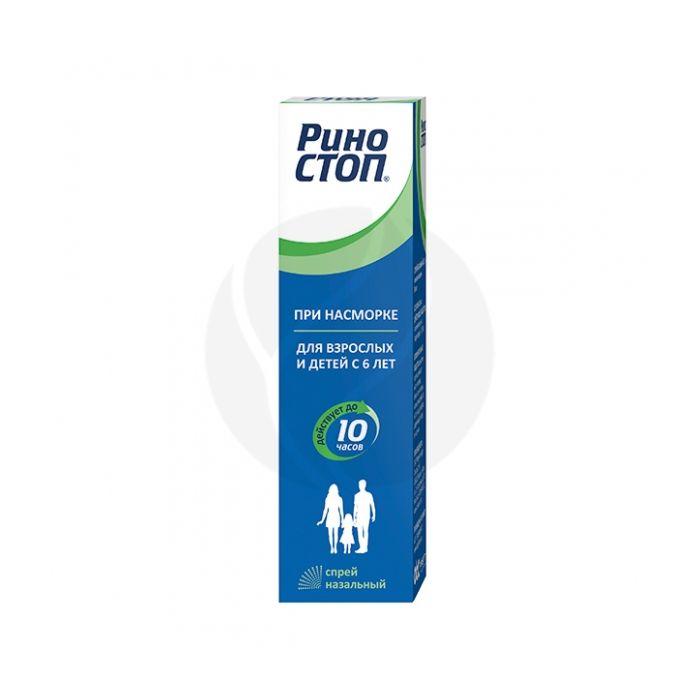Rinostop spray 0.1%, 15 ml
Expiration Date: 05/2027
Russian Pharmacy name:
Риностоп спрей 0,1%, 15 мл
Acute allergic rhinitis
sinusitis,
hay fever,
otitis media (to reduce swelling of the nasopharyngeal mucosa),
preparation of the patient for diagnostic procedures in the nasal passages.
The drug is administered intranasally. Spraying is carried out after removing the safety cap from the sprayer. The nebulizer is inserted into the nose and, pressing on its base, is sprayed for 1 second. During the administration of the drug, the bottle should be held with the spray upwards.
Nasal spray 0.1% is prescribed for adults and children over the age of 6 years, 1 injection from a nebulizer into each nasal passage. Usually 3-4 injections per day are enough; the drug should not be used more than 3 times / day.
Nasal spray 0.05% is prescribed for children aged 2 to 6 years, 1 injection from a nebulizer into each nasal passage 1-2 times / day; the drug should not be used more than 3 times / day.
Do not use the drug without interruption for more than 3-5 days.
Nasal spray in the form of a clear, colorless or slightly colored liquid.
1 ml
xylometazoline hydrochloride 0.5 / 1 mg
Excipients: disodium edetate (Trilon B) - 0.5 mg, sodium chloride - 9 mg, benzalkonium chloride - 0.15 mg, potassium dihydrogen phosphate - 3.63 mg, sodium hydrogen phosphate dodecahydrate - 7.13 mg, purified water - up to 1 ml.
Arterial hypertension; tachycardia;
severe atherosclerosis;
glaucoma;
atrophic rhinitis;
surgical interventions on the meninges (in history);
condition after transsphenoidal hypophysectomy;
pregnancy;
children under 2 years of age (for RinostopЃ 0.05%);
children under 6 years of age (for RinostopЃ 0.1%);
hypersensitivity to xylometazoline and other components of the drug.
With caution, the drug should be prescribed for diabetes mellitus, hyperthyroidism, pheochromocytoma, diseases of the cardiovascular system (including coronary artery disease), prostatic hyperplasia, during lactation, patients with hypersensitivity to adrenomimetics, accompanied by insomnia and dizziness.
pharmachologic effect
A vasoconstrictor drug for local use in ENT practice. Xylometazoline belongs to the group of decongestants with alpha-adrenomimetic activity. It causes narrowing of the blood vessels of the nasal mucosa, thus eliminating edema and hyperemia of the nasal mucosa, restores the patency of the nasal passages, and facilitates nasal breathing.
The action of the drug occurs a few minutes after its use and lasts up to 10 hours.
Pharmacokinetics
When applied topically, the drug is practically not absorbed, therefore its concentration in the blood plasma is very low (it is not determined by modern analytical methods).
Side effect
From the respiratory system: with frequent and / or prolonged use - irritation and / or dryness of the nasopharyngeal mucosa, burning and paresthesia of the nasal mucosa, sneezing, hypersecretion of the nasal mucosa, edema of the nasal mucosa.
From the side of the cardiovascular system: with frequent and / or prolonged use - a feeling of palpitations, increased blood pressure, tachycardia, arrhythmia.
From the nervous system: with frequent and / or prolonged use - headache, insomnia; with long-term use in high doses - depression.
Others: with frequent and / or prolonged use - vomiting, visual impairment.
Benzalkonium chloride, which is part of the drug, can cause irritation of the nasal mucosa.
Application during pregnancy and lactation
During pregnancy, the use of the drug is contraindicated.
During lactation, the drug should be prescribed only if the intended benefit to the mother outweighs the potential risk to the child. Do not exceed the recommended dose.
Application in children
The use of the drug is contraindicated in children under 2 years of age (for RinostopЃ 0.05%), in children under 6 years of age (for RinostopЃ 0.1%).
special instructions
Do not use the drug for a long time (more than 7 days), for example, with chronic rhinitis.
Avoid getting the drug in the eyes (the drug affects vision).
With prolonged use (more than 1 week), the symptoms of nasal congestion may recur.
Influence on the ability to drive vehicles and mechanisms
In the case of the development of systemic side effects (headache, palpitations, increased blood pressure, visual impairment), it is necessary to refrain from driving vehicles and engaging in other potentially hazardous activities that require increased concentration of attention and speed of psychomotor reactions.
Overdose
Symptoms: nausea, vomiting, cyanosis, fever, tachycardia, arrhythmia, increased blood pressure, shortness of breath, mental disorders, central nervous system depression (drowsiness, decreased body temperature, bradycardia, decreased blood pressure, respiratory arrest and coma).
Treatment: carrying out symptomatic therapy; in case of accidental ingestion - gastric lavage, intake of activated charcoal.
Drug interactions
Do not use during therapy with MAO inhibitors and tricyclic antidepressants (including a period of 14 days after their withdrawal).

